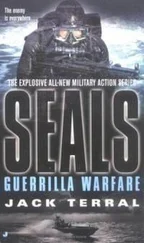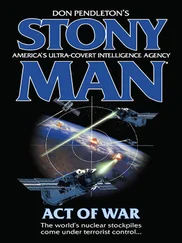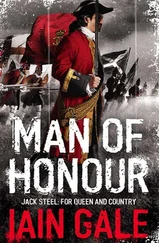The storm appeared to be moving in the same direction as the Pueblo . Bucher hoped to escape the worst of it when he swung north toward Sasebo. But the tempest, perversely, pivoted with him, tearing at his ship as it fought its way past the threatening shoals of Kyushu’s west coast. Waves surged higher as contrary currents in the area collided. Hail, rain, and snow pelted the ship, and the wind accelerated to 50 knots—a force-ten gale. A big antenna snapped off in the rising howl.
So loud was the storm that the men in the engine room had to communicate by hand signals. In the forward berthing compartment, fetid with vomit and anxiety, shoes and other personal items floated on several inches of sloshing water. Men’s heads, elbows, and knees slammed into hard metal objects, inducing shrieks of pain.
Communication technicians skittered across the SOD hut deck in unsecured chairs, banging into steel consoles and gauges. Someone on the bridge tried to warn the men below by yelling, “Roll!” over the public address system each time the ship started to shift. But the CTs got bashed anyway, since their chamber lacked a loudspeaker. Two generators supplying electricity to the hut went dead.
In the dizzily swaying pilothouse, Bucher struggled to keep the ship from skidding sideways in a trough and getting flipped over by the next wave. He applied power alternately to the port and starboard propellers, trying to keep moving in a relatively straight line. The steering engine was holding so far. But after another round of vertiginous rolls, the skipper ran for shelter in the lee of a coastal island.
A few hours later, as the big blow subsided and the crew recovered somewhat, Bucher ordered the Pueblo to get under way again for Sasebo, still 100 miles away. Weary from his exertions on the bridge, the captain turned the conn over to Tim Harris and descended to his stateroom for a brief rest. He’d dozed for no more than an hour when the buzzing telephone next to his bunk woke him. He picked it up and heard a heart-stopping report from his inexperienced ensign:
“Captain, we are on course, but I think I see breakers about a half mile dead ahead.”
It was one of a ship commander’s worst fears. The Pueblo was headed directly toward a large rock.
“Back down emergency full!” Bucher shouted into the phone, ordering the twin diesels thrown into reverse. “And come dead in the water! I’ll be right up there.”
He raced to the bridge. Sure enough, there was the deadly black mass, ringed by white breakers and looming out of the slanting rain 1,000 yards away. Bucher sweated blood for several minutes while he maneuvered away from the reef and took soundings to make certain the Pueblo had enough water under its keel to proceed safely.
Harris had been following a course plotted by Ed Murphy. If not for the ensign’s timely call to his captain, the ship might be getting battered and gouged to death right now. Bucher could barely contain his anger. He remained on the bridge just long enough to chart a new course for the shaken Harris. Then he returned to his quarters and summoned Murphy.
The captain demanded an explanation of what he viewed as a stupid and potentially fatal navigation error. The exec replied that it wasn’t his fault; his course had been accurate, but young Harris hadn’t followed it correctly. Bucher felt himself losing it.
“Jesus Christ, mister!” he yelled. “Don’t you think maybe you should get the hell out of this business? … Shit, man! After all the time and chances you’ve had, do you really expect me to take this kind of crap from you?”
Murphy stared in distress at his superior.
“I laid out the course as carefully as I could in these conditions, Captain,” he replied, a defiant note in his voice.
“You are my executive and navigation officer!” Bucher bellowed. “If I can’t rely on you in those duties, what the hell use are you?”
Murphy’s Adam’s apple bobbed up and down. “Yes, sir, Captain, I’m trying my best, but …”
“It’s not good enough!”
A pained silence followed, broken only by the moan of the wind and the crash of green seas on the decks above. Murphy made a stab at a formal exit, trying to come to attention in the rolling cabin and almost missing the door as he walked out. Bucher was convinced the time had finally come to get rid of his XO. But still he couldn’t bring himself to take such drastic action during this inaugural mission.
At least Bucher now knew exactly what the mission was. Admiral Johnson’s headquarters had radioed him the last details after the Pueblo left Yokosuka. The main objective was to collect fresh information on North Korean shore defenses. The hermetic communist state was believed to have both antiaircraft and antiship missile batteries along its mountainous east coast. Bucher’s crew was to sail to a point near North Korea’s border with the Soviet Union and then turn around and move slowly south, sampling the electronic environment and making visual observations. The Navy and the National Security Agency were particularly interested in coastal radar.
The Pueblo also was to observe North Korean naval activity, including any movements of the four Soviet-made submarines the North Koreans were suspected of operating out of the port of Mayang-do. After about two weeks, Bucher and his men would head back to Japan, photographing and listening to Soviet warships along the way.
Throughout the voyage the Pueblo was to maintain strict emission control, meaning its radar and radios were to be kept off unless Bucher was certain his ship had been identified. Only then was he to transmit situation reports to COMNAVFORJAPAN. At no time should the ferret creep closer than 13 nautical miles to the North Korean mainland or offshore islands; the Navy wanted to make sure it stayed outside the communists’ claimed 12-mile territorial limit.
Admiral Johnson also reiterated his verbal instruction that the machine guns be covered or stowed. The captain was to use them, in the terse language of his sailing order, “only in cases where threat to survival is obvious.” But since the ship would operate entirely in international waters, the order continued, the mission’s risk was rated “minimal.” Once again, Bucher was led to believe that a high-seas assault was unlikely.
The Pueblo arrived in Sasebo on January 9, already behind schedule due to the storm. For the first few hours most of the seamen simply rested, recovering from the stomach-inverting first leg of their journey. Then they began getting ready for the next segment. The boat had to be cleaned up and tossed-about gear put back in place. A hairline crack had appeared in the hull; Japanese divers went down to repair it.
Lieutenant Steve Harris offloaded more excess classified documents—15 sealed containers in all. But to his dismay he discovered that enough new paper was being delivered to the ship in Sasebo to more than offset what he’d gotten rid of. Why was it that seemingly every Navy command in the Pacific wanted to give him this stuff? So large was the volume of material, he realized, that it couldn’t possibly fit into the canvas bags in which it was supposed to be dumped overboard in an emergency.
Although Bucher had expected only a 12-hour layover in Sasebo, repairs and refitting took nearly two days.
The ship was to depart at six a.m. on January 11. At five a.m., a courier arrived with even more classified publications for Steve Harris’s heap. At 5:45 a.m., Bucher rushed aboard after a long night of drinking and playing cards ashore.
Less than half an hour later, the Pueblo edged out of Sasebo harbor. Despite his lack of sleep, Bucher had the conn. Nearby was Charlie Law, navigating in the chilly predawn darkness.
Читать дальше












